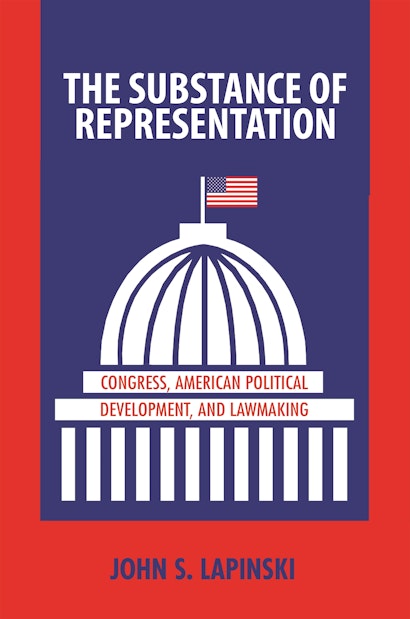Lawmaking is crucial to American democracy because it completely defines and regulates the public life of the nation. Yet despite its importance, political scientists spend very little time studying the direct impact that the politics surrounding a particular issue has on lawmaking. The Substance of Representation draws on a vast range of historical and empirical data to better understand how lawmaking works across different policy areas. Specifically, John Lapinski introduces a theoretically grounded method for parsing policy issues into categories, and he shows how policymaking varies in predictable ways based on the specific issue area being addressed.
Lapinski examines the ways in which key factors that influence policymaking matter for certain types of policy issues, and he includes an exhaustive look at how elite political polarization shifts across these areas. He considers how Congress behaves according to the policy issue at hand, and how particular areas—such as war, sovereignty issues, and immigration reform—change legislative performance. Relying on records of all Congressional votes since Reconstruction and analyzing voting patterns across policy areas from the late nineteenth to late twentieth centuries, Lapinski provides a comprehensive historical perspective on lawmaking in order to shed light on current practices.
Giving a clear picture of Congressional behavior in the policymaking process over time, The Substance of Representation provides insights into the critical role of American lawmaking.
John S. Lapinski is the Robert A. Fox Professor of Political Science at the University of Pennsylvania and the director of elections for NBC News. He is the coeditor of The Macropolitics of Congress (Princeton).
"Lapinski develops a new tool kit to measure and analyze an expansive set of legislation and lawmakers' policy preferences from 1877 to 2010. His key contribution to the study of the American national legislature is his coding approach and the data development, which develops a deeper understanding of lawmaking. Through these, Lapinski offers findings about polarization, elite leadership in Congress, and the influence and impact of members of Congress and their policy preferences across different areas. This work will certainly contribute to developing a new discussion within the legislative studies field and give future political scientists new possibilities of expanding the research in the area."—Choice
"He offers an astutely crafted schema that seems to this observer to avoid the trap of time boundedness and enables the APD enterprise to more systematically track the evolution of policy."—Ross K. Baker, Congress & The Presidency
"Students of Congress think they are studying what government does when they examine roll call votes. In this powerful and original contribution to legislative and policy studies and American political development, John Lapinski shows otherwise. The substance of policy—what sorts of laws members of Congress are voting on—makes an enormous difference for theory, method, American political history, and our conclusions about how Congress works."—Jacob S. Hacker, Yale University
"I salute John Lapinski for this innovative work on American lawmaking. The book offers deft history, a good measure of the significance of laws, and a helpful categorization of laws by substantive area. In a welcome move, it annexes Congress to the study of American political development."—David Mayhew, author of Partisan Balance
"The Substance of Representation is a provocative book. Lapinski urges scholars to incorporate the substance of policy into models of lawmaking and shows us with impressive historical sweep how this can be fruitfully done."—Sarah Binder, George Washington University
"This important book will force scholars to adopt a higher standard of analysis when discussing policymaking in the American system. It challenges the power and accuracy of a widely used measure of ideological roll call voting. And by collecting, coding, and categorizing all major public laws over a vast period of history, this book provides a rich and comprehensive look at how U.S. policies have been enacted in key issue areas."—Wendy Schiller, Brown University
"Making several vital contributions to the historical study of the U.S. Congress, this book develops a theoretically grounded system for coding the substance of laws and roll calls, lays out the best measure of legislative significance in the field and applies it across 120 years of American political history, and tests the sources of legislative productivity across distinct substantive policy domains."—Eric Schickler, University of California, Berkeley

